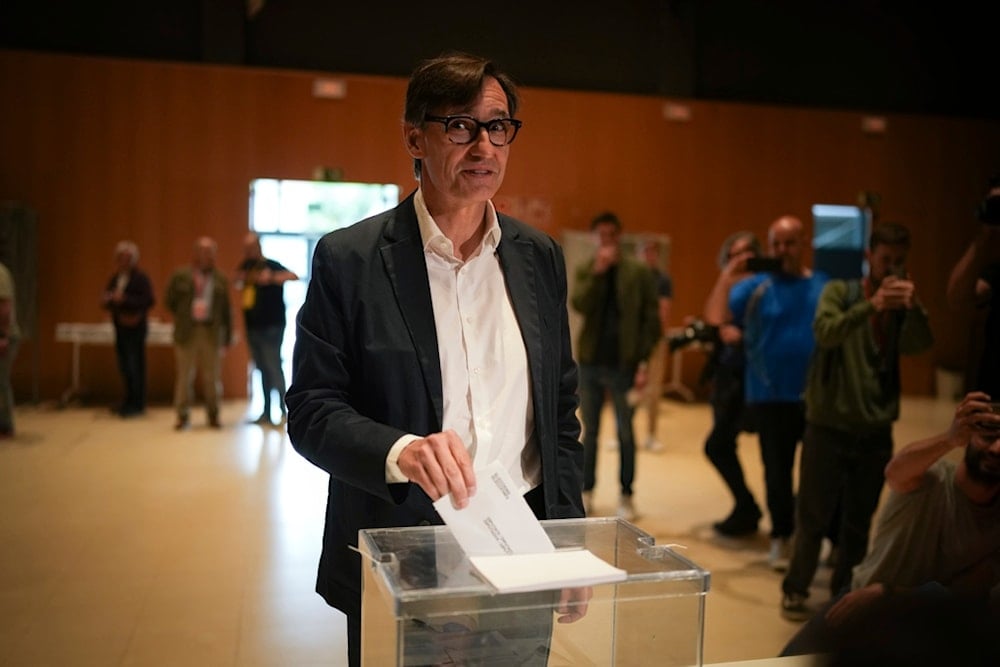Catalans vote in test of dwindling independence movement's strength
Polls suggest that Salvador Illa, former Spanish Health Minister and current leader of the Catalan branch of the Socialist Party (PSC), will lead the election.
-

Socialist candidate Salvador Illa casts his ballot at a polling station in La Roca del Valles, north of Barcelona, Sunday, May 12, 2024 (AP Photo/Emilio Morenatti)
Catalans headed Sunday to polls in a snap regional election to cast their ballots and elect 135 lawmakers in the parliament in a test of the dwindling independence movement's strength and Spain's socialist Prime Minister Pedro Sanchez's conciliatory approach.
The decision to hold the election was made in March by Catalan President Pere Aragones, a member of the moderate pro-independence Catalan Republican Left party (ERC) after opposition parties rejected the budget proposed by his minority government.
Previously, the ERC had governed in coalition with the staunchly pro-independence Together for Catalonia (Junts) party, led by the self-exiled former Catalan President Carles Puigdemont. However, persistent disagreements led Junts to withdraw from the government in October 2022.
This election is being held six and a half years after Puigdemont ignited Spain's most significant political crisis in decades by orchestrating a unilateral referendum on regional independence, followed by a declaration of independence.
The conservative Spanish government at the time dispatched thousands of police officers to prevent voting, often resorting to violence. Puigdemont and his cabinet were subsequently dismissed, the regional parliament dissolved, and direct control of Catalonia was assumed by Madrid. Puigdemont fled Spain to evade arrest while other prominent figures in the independence movement faced trial and imprisonment.
Since Sanchez assumed office in 2018, tensions have eased and the Prime Minister pardoned in 2021 nine independence leaders implicated in the failed secession attempt, advocating for a new "era of dialogue and understanding."
In April, Sanchez also introduced an amnesty law to secure support from ERC and Junts, enabling his return to power after last summer's inconclusive general election. The amnesty law, benefiting Puigdemont among others, encompasses approximately 400 individuals involved in the independence referendum of November 2014 and the subsequent poll three years later.
The bill is in the Senate and is due to become law in the coming weeks, allowing the return of Puigdemont. But the measure has been adamantly opposed by the right and far-right.
Polls suggest that Salvador Illa, former Spanish Health Minister and current leader of the Catalan branch of the Socialist Party (PSC), will lead the election, followed by Junts and then ERC. The pivotal questions revolve around whether Illa can garner enough support to form a government and whether the two primary pro-independence parties can collectively secure over 50% of the vote.
Puigdemont, anticipating his return to Spain once the amnesty law takes effect, has hinted at his party's withdrawal of support for Sanchez if it disagrees with the composition of a PSC-led government. Unable to enter Spain, where he is subject to an arrest warrant, he has been campaigning in southern France. He has vowed to retire from politics if he fails to win.
It is noteworthy that recent polls indicate a waning appetite for an independent Catalonia. In October 2017, at the crisis peak, a survey by the Catalan government's Center for Opinion Studies showed 48.7% of Catalans favored independence, while 43.6% opposed it. However, a March poll from the same center found that 51% were against independence, with 42% in favor.
Read more: Spain's parliament to draft bill to legalize undocumented migrants

 3 Min Read
3 Min Read








